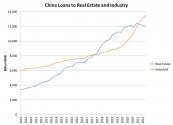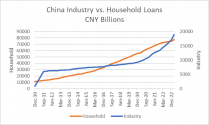You are using an out of date browser. It may not display this or other websites correctly.
You should upgrade or use an alternative browser.
You should upgrade or use an alternative browser.
Chinese Economics Thread
- Thread starter Norfolk
- Start date
Pretty weak numbers really.
Already evident in all the export PMI numbers we saw, especially manufacturing.
Also shows why PBOC seems to be allowing RMB to fall without any intervention.
Also keep in mind that RMB is down, so in RMB terms, this may not be down YoY
Russian trade very good
$94B in 5 month, $20.6B in May. Let's just it will continue to increase throughout the year. $20B/month or $240B seems likely
Look at that, Russia not far off Japan & Korea
Another interesting one in there is just how much Brazil exports to China
Africa now is more than Japan & Korea
$94B in 5 month, $20.6B in May. Let's just it will continue to increase throughout the year. $20B/month or $240B seems likely
Look at that, Russia not far off Japan & Korea
Another interesting one in there is just how much Brazil exports to China
Africa now is more than Japan & Korea
I think what Huawei is doing on software side is impressive. Basically, they had to find alternatives to Western products. They already had in house products, but they developed them to the point where they can completely replace Western ones and now they have started replacing them in large banks & energy companies.
From the always angry HW before HR
And looks like Huawei is trying to get further into finance sector
Of course, all of this helps Huawei. But maybe Alibaba & Tencent need to work a little harder in these areas too if they don't want to loose cloud customers to Huawei because they haven't provided other software help
already some major players here that will no longer rely on oracle. Finance and energy sectors are major national security areas. You definitely don't want American firms to have the ability to disrupt day to day operations截至目前,GaussDB已广泛应用于金融行业,支撑了中国工商银行、中国邮政储蓄银行、中国建设银行、中国农业银行等国有大行的核心业务。此外,也服务了陕西省财政厅、中石油、中海油、国家管网等关键行业企业。
PSBC completed migrate to new distributed bank system last year and uses GaussDB. Claims significantly improved performance中国邮储银行去年刚完成了新一代个人业务分布式核心系统数据迁移,这也是全球最大的银行分布式核心系统,新系统中使用的就是GaussDB。
从直观效率来看,新系统上线后可为全行6.5亿个人客户、4万多个网点提供日均20亿笔、峰值6.7万笔/秒的交易处理能力,全天联机平均耗时由93毫秒减少为65毫秒,比老核心系统降低30%。
在2022年9月末的三季度结息中,仅用时25分钟,相比过去的140分钟,实现了效率倍增,性能得到大幅提高。中国邮储银行首席信息官牛新庄曾直言:“这不仅仅是替代,更是全方面的超越!”
From the always angry HW before HR
Huawei now has GaussDB and UStore storage and MetaERP that it's promoting to domestic companies, I'm sure SOEs will be nudged to migrate to this. And aside from national security point of view, this will reduce the money they send to Western companies一些半桶水的喜欢说这是国外源代码换皮,现在华为直接官宣核心代码100%自主研发,还有什么可辩的?
这个突破是让中国金融安全安全可控的一个关键设施,很多金融机构不得不用美国Oracle的数据库。
媒体报道:6月7日,在2023年华为全球智慧金融峰会上,华为云正式推出国内唯一能够做到软硬件协同、全栈自主的分布式云数据库GaussDB,实现核心代码100%自主研发,引发网友热议。长期以来,我国的金融、电信、航空等领域一直被“IOE”(即IBM的小型机、Oracle的数据库、EMC的存储设备)支配,而今,华为率先破局核心技术,带动中国自研数据库迈出“关键一步”,而这一切才刚刚开始。
And looks like Huawei is trying to get further into finance sector
Of course, all of this helps Huawei. But maybe Alibaba & Tencent need to work a little harder in these areas too if they don't want to loose cloud customers to Huawei because they haven't provided other software help
Huawei sees finance sectors as one of its 4 pillars I guess. It uses catchy terms to basically encourage finance sector to use its products. Of course, some domestic competitors will loose out, but a lot of Western tech firms will loose out. I think what we are seeing is that with all the sanctions, Huawei got forced to shift focus and develop product in many ways will counter sanction the west. Since domestic firms will move over to using Huawei products in areas like GPUs, AI, database, OS, ERP and other software. Even if there isn't a formal sanction retaliation, it will work in that direction在上海举办华为全球智慧金融峰会2023上,华为数字金融军团CEO曹冲表示,华为在金融行业已经深耕了13年,目前华为在全球60个国家或地区,全球金融客户超过33000家,其中包括了50家全球Top100银行,华为在中国金融云和基础设施里面已经是第一名。
据悉,数字金融军团是华为在去年成立的第三批军团,曹冲介绍,华为数字金融军团的四大战略主要方向是,帮助客户筑牢基础设施韧性、加速应用现代化、助力业务场景创新和跃升决策数智化。
Look at this, these are major banks. The only major one missing is bank of China. And also Sinopec from the hydrocarbon companies. hopefully, this can extend to more sectors going forward截至目前,GaussDB已广泛应用于金融行业,支撑了中国工商银行、中国邮政储蓄银行、中国建设银行、中国农业银行等国有大行的核心业务。此外,也服务了陕西省财政厅、中石油、中海油、国家管网等关键行业企业。
I do wonder if there are other Chinese database also entering major foreign banks and corporations. Looks like they are getting customers in Asia and South America. This to me seems like it would scare certain China hawks.第五、中国数据库要走向全球市场,给世界一个更优选择。国产数据库在中国市场的场景中历练,同时也要走向全球市场。目前,亚洲的很多银行已经开始选用和测试华为云GaussDB数据库,在南美也有很多客户开始测试。面向新时代,分布式云上的数据库一定是一个更新的、更优的选择。中国的软件开发商应立足中国、面向全球,与华为GaussDB数据库一起出海,在海外做好应用,服务全球企业、政府的数字化需求。
Aside from that, it would be a great thing if Chinese software industry can make a bigger dent elsewhere
of course, training talent is important, but 39k is minute compared to the 1.5 million developers on Ascend platform. To be fair, database is pretty common everywhere so picking up new databases isn't too difficult.第四、培养关键人才,产教融合,保障开发者和创新人才供给。人才是国产数据库持续做大做强的核心要素之一,但也最容易被忽略,或者优先级放得很低。华为公司从2019年起和教育部门合作,通过智能基座和新工科2大产教融合项目,持续投入和帮助国内超过110所高校开办了数据库课程,截至目前已经培育了3.9万名GaussDB数据库人才。未来,华为还将持续投入从高校抓起,为产业保障数据库人才供给
For folks who are gungho about GDP growth in 2023:
This is the data you need to understand.
TL;DR is that there is about 7.2trln of revenue hole in the government budget as a result of real estate deflation (assuming 2022 land sales/revenues are run-rate), which is ~5.9% of GDP. The net impact on GDP will be higher given multiplier effect of this government fiscal impulse drag. Keep in mind, this is a gross revenue figure and excludes reductions in demolition/compensation for the land acquisition. However, this is more important for local governments' fiscal balance and less so for GDP calculation (since demolition companies make money and add value to GDP).
Going back to what I was saying earlier this year, consumer spending is recovering, Chinese EVs are amazing, and advanced manufacturing is great, but none of that is sufficient to offset this big hole.
The only solution is a central government bailout - we've heard nothing on that. My expectation of 5.5% GDP growth for 2023 is probably at risk of negative revision unless the central government does something here. The irony here is that the central government has to do something like TARP.
Here is another article that outlines the issue with 2022 data.
This is the data you need to understand.
TL;DR is that there is about 7.2trln of revenue hole in the government budget as a result of real estate deflation (assuming 2022 land sales/revenues are run-rate), which is ~5.9% of GDP. The net impact on GDP will be higher given multiplier effect of this government fiscal impulse drag. Keep in mind, this is a gross revenue figure and excludes reductions in demolition/compensation for the land acquisition. However, this is more important for local governments' fiscal balance and less so for GDP calculation (since demolition companies make money and add value to GDP).
Going back to what I was saying earlier this year, consumer spending is recovering, Chinese EVs are amazing, and advanced manufacturing is great, but none of that is sufficient to offset this big hole.
The only solution is a central government bailout - we've heard nothing on that. My expectation of 5.5% GDP growth for 2023 is probably at risk of negative revision unless the central government does something here. The irony here is that the central government has to do something like TARP.
Here is another article that outlines the issue with 2022 data.
Last edited:
Real estate needs to be corrected in China as it is a huge drag on the economy in general, similar to Japan during the lost decade. If everyone is putting their money into real estate, consumption will never go up and dependency on external markets will only grow, not to mention the knock on effects on family formation and demographics.
Property tax is the only viable solution, just need the political will to suffer a down turn as it is inevitable when real estate crashes.
Property tax is the only viable solution, just need the political will to suffer a down turn as it is inevitable when real estate crashes.
Real estate prices need to crash ~80% at a minimum. Look at the price-to-income ratios for T1 cities in China and compare them to expensive cities like London and Sydney. The latter look like bargain prices in comparison.Real estate needs to be corrected in China
There are two major mistakes the CCP made during the last half-century. The first is real estate sector generally, allowing it to appreciate beyond reason and focusing land sales model to fund local governments by too large of an extent. The second is the 1 child policy. The latter is now a ship that has sailed but the former can still be corrected.
Better bite the bullet and accept a low-growth decade but make young Chinese people able to buy real estate without getting the whole extended family into debt. I wonder how much of weak consumption is just because of the insane amount of saving you need to do to buy your own real estate.
Real estate needs to be corrected in China as it is a huge drag on the economy in general, similar to Japan during the lost decade. If everyone is putting their money into real estate, consumption will never go up and dependency on external markets will only grow, not to mention the knock on effects on family formation and demographics.
Property tax is the only viable solution, just need the political will to suffer a down turn as it is inevitable when real estate crashes.
Trend has changing rapidly.Real estate prices need to crash ~80% at a minimum. Look at the price-to-income ratios for T1 cities in China and compare them to expensive cities like London and Sydney. The latter look like bargain prices in comparison.
There are two major mistakes the CCP made during the last half-century. The first is real estate sector generally, allowing it to appreciate beyond reason and focusing land sales model to fund local governments by too large of an extent. The second is the 1 child policy. The latter is now a ship that has sailed but the former can still be corrected.
Better bite the bullet and accept a low-growth decade but make young Chinese people able to buy real estate without getting the whole extended family into debt. I wonder how much of weak consumption is just because of the insane amount of saving you need to do to buy your own real estate.
China continues to shift resources towards manufacturing and away from housing.


